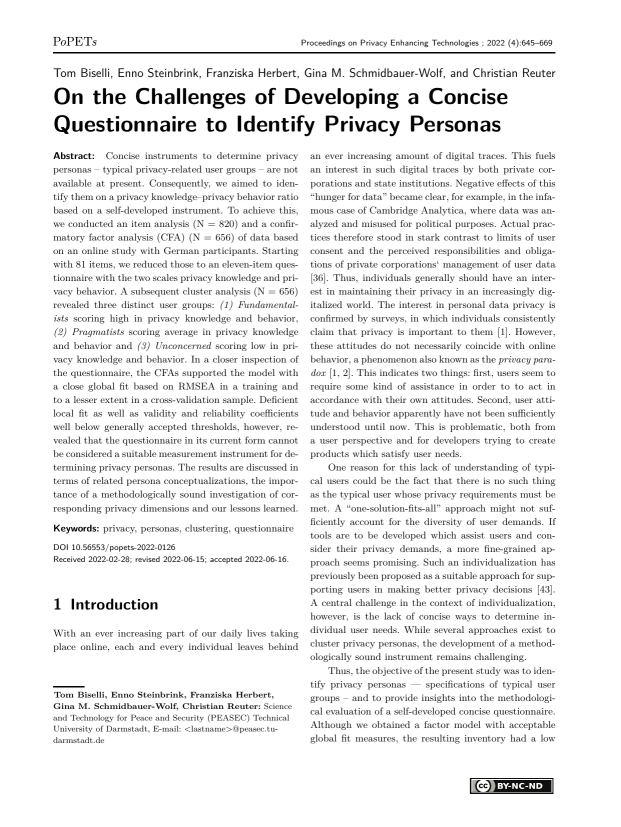On the Challenges of Developing a Concise Questionnaire to Identify Privacy Personas
Authors: Tom Biselli (Science and Technology for Peace and Security (PEASEC) Technical University of Darmstadt), Enno Steinbrink (Science and Technology for Peace and Security (PEASEC) Technical University of Darmstadt), Franziska Herbert (Science and Technology for Peace and Security (PEASEC) Technical University of Darmstadt), Gina M. Schmidbauer-Wolf (Science and Technology for Peace and Security (PEASEC) Technical University of Darmstadt), Christian Reuter (Science and Technology for Peace and Security (PEASEC) Technical University of Darmstadt)
Volume: 2022
Issue: 4
Pages: 645–669
DOI: https://doi.org/10.56553/popets-2022-0126
Abstract: Concise instruments to determine privacy personas – typical privacy-related user groups – are not available at present. Consequently, we aimed to identify them on a privacy knowledge–privacy behavior ratio based on a self-developed instrument. To achieve this, we conducted an item analysis (N = 820) and a confirmatory factor analysis (CFA) (N = 656) of data based on an online study with German participants. Starting with 81 items, we reduced those to an eleven-item questionnaire with the two scales privacy knowledge and privacy behavior. A subsequent cluster analysis (N = 656) revealed three distinct user groups: (1) Fundamentalists scoring high in privacy knowledge and behavior, (2) Pragmatists scoring average in privacy knowledge and behavior and (3) Unconcerned scoring low in privacy knowledge and behavior. In a closer inspection of the questionnaire, the CFAs supported the model with a close global fit based on RMSEA in a training and to a lesser extent in a cross-validation sample. Deficient local fit as well as validity and reliability coefficients well below generally accepted thresholds, however, revealed that the questionnaire in its current form cannot be considered a suitable measurement instrument for determining privacy personas. The results are discussed in terms of related persona conceptualizations, the importance of a methodologically sound investigation of corresponding privacy dimensions and our lessons learned.
Keywords: privacy, personas, clustering, questionnaire
Copyright in PoPETs articles are held by their authors. This article is published under a Creative Commons Attribution-NonCommercial-NoDerivs 3.0 license.


